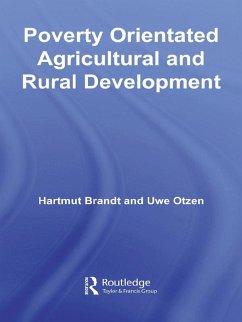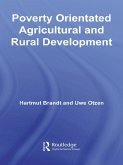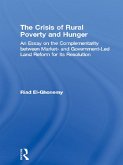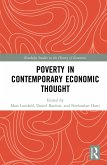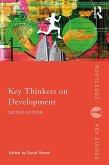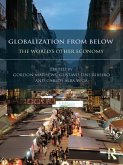41,95 €
41,95 €
inkl. MwSt.
Sofort per Download lieferbar

21 °P sammeln
41,95 €
Als Download kaufen

41,95 €
inkl. MwSt.
Sofort per Download lieferbar

21 °P sammeln
Jetzt verschenken
Alle Infos zum eBook verschenken
41,95 €
inkl. MwSt.
Sofort per Download lieferbar
Alle Infos zum eBook verschenken

21 °P sammeln
- Format: ePub
- Merkliste
- Auf die Merkliste
- Bewerten Bewerten
- Teilen
- Produkt teilen
- Produkterinnerung
- Produkterinnerung

Bitte loggen Sie sich zunächst in Ihr Kundenkonto ein oder registrieren Sie sich bei
bücher.de, um das eBook-Abo tolino select nutzen zu können.
Hier können Sie sich einloggen
Hier können Sie sich einloggen
Sie sind bereits eingeloggt. Klicken Sie auf 2. tolino select Abo, um fortzufahren.

Bitte loggen Sie sich zunächst in Ihr Kundenkonto ein oder registrieren Sie sich bei bücher.de, um das eBook-Abo tolino select nutzen zu können.
Brandt and Otzen's key book undertakes a wide-ranging conceptual reorientation of development cooperation, criticizing the current orthodoxy and its bias towards urban areas.
- Geräte: eReader
- mit Kopierschutz
- eBook Hilfe
- Größe: 1.56MB
Andere Kunden interessierten sich auch für
![Poverty Orientated Agricultural and Rural Development (eBook, PDF) Poverty Orientated Agricultural and Rural Development (eBook, PDF)]() Hartmut BrandtPoverty Orientated Agricultural and Rural Development (eBook, PDF)41,95 €
Hartmut BrandtPoverty Orientated Agricultural and Rural Development (eBook, PDF)41,95 €![The Crisis of Rural Poverty and Hunger (eBook, ePUB) The Crisis of Rural Poverty and Hunger (eBook, ePUB)]() M. Riad El-GhonemyThe Crisis of Rural Poverty and Hunger (eBook, ePUB)45,95 €
M. Riad El-GhonemyThe Crisis of Rural Poverty and Hunger (eBook, ePUB)45,95 €![Poverty in Contemporary Economic Thought (eBook, ePUB) Poverty in Contemporary Economic Thought (eBook, ePUB)]() Poverty in Contemporary Economic Thought (eBook, ePUB)39,95 €
Poverty in Contemporary Economic Thought (eBook, ePUB)39,95 €![Key Thinkers on Development (eBook, ePUB) Key Thinkers on Development (eBook, ePUB)]() Key Thinkers on Development (eBook, ePUB)26,95 €
Key Thinkers on Development (eBook, ePUB)26,95 €![The Competitiveness of European Industry (eBook, ePUB) The Competitiveness of European Industry (eBook, ePUB)]() The Competitiveness of European Industry (eBook, ePUB)51,95 €
The Competitiveness of European Industry (eBook, ePUB)51,95 €![Nature, Choice and Social Power (eBook, ePUB) Nature, Choice and Social Power (eBook, ePUB)]() Erica SchoenbergerNature, Choice and Social Power (eBook, ePUB)49,95 €
Erica SchoenbergerNature, Choice and Social Power (eBook, ePUB)49,95 €![Globalization from Below (eBook, ePUB) Globalization from Below (eBook, ePUB)]() Globalization from Below (eBook, ePUB)45,95 €
Globalization from Below (eBook, ePUB)45,95 €-
-
-
Brandt and Otzen's key book undertakes a wide-ranging conceptual reorientation of development cooperation, criticizing the current orthodoxy and its bias towards urban areas.
Dieser Download kann aus rechtlichen Gründen nur mit Rechnungsadresse in A, B, BG, CY, CZ, D, DK, EW, E, FIN, F, GR, HR, H, IRL, I, LT, L, LR, M, NL, PL, P, R, S, SLO, SK ausgeliefert werden.
Produktdetails
- Produktdetails
- Verlag: Taylor & Francis
- Seitenzahl: 384
- Erscheinungstermin: 20. Dezember 2006
- Englisch
- ISBN-13: 9781134205134
- Artikelnr.: 42635891
- Verlag: Taylor & Francis
- Seitenzahl: 384
- Erscheinungstermin: 20. Dezember 2006
- Englisch
- ISBN-13: 9781134205134
- Artikelnr.: 42635891
- Herstellerkennzeichnung Die Herstellerinformationen sind derzeit nicht verfügbar.
Hartmut Brandt began his professional education with three years of farming practice (1960-62) and continued with eight years of academic study and research in agricultural sciences and economics at Kiel University, Technical University of Berlin and Makerere University College, Kampala. Thereafter, followed thirty-two years of applied research, consulting work and postgraduate training based at the German Development Institute (GDI). Dr Brandt retired in 2002 but continues his consultative activities.
Uwe Otzen is senior research fellow at the German Development Institute (GDI). He studied international agricultural science at the Technical University of Berlin, where he obtained his PhD in 1973. He worked four years in Malawi as agricultural consultant and project manager for a regional development project of the GTZ, the German Agency for Technical Cooperation, before he joined the German Development Institute in 1977, where he worked as research fellow in the Africa Department. Between 1982 and 1986 he spent four years in Zimbabwe as agricultural and rural development advisor to the Ministry of Lands, Resettlement and Rural Development in Harare.
Uwe Otzen is senior research fellow at the German Development Institute (GDI). He studied international agricultural science at the Technical University of Berlin, where he obtained his PhD in 1973. He worked four years in Malawi as agricultural consultant and project manager for a regional development project of the GTZ, the German Agency for Technical Cooperation, before he joined the German Development Institute in 1977, where he worked as research fellow in the Africa Department. Between 1982 and 1986 he spent four years in Zimbabwe as agricultural and rural development advisor to the Ministry of Lands, Resettlement and Rural Development in Harare.
Part A: Approaches to Poverty Reduction through Agricultural Development
1. Background to the Problem: World Food Question 2. Motive for the Study:
New Urban Bias in Development Cooperation 3. Poverty Reduction in the
Conceptual Experience of Agricultural Development 4. Economic Growth,
Agricultural Development, Poverty Reduction 5. Fazit Part B: Institutional
and Organizational Ways for Rural Communities of Sub-Saharan Africa to
Reduce Poverty 1. Global Framework for Sustainable and Poverty-Reducing
Agricultural and Rural Development 2. Realistic Problem-Solving Approaches
3. Importance for Development Policy of Preconditions for and Effects of
Decentralization 5. Decentralization and Development Cooperation Priorities
5. Institutional and Organizational Implementation Options 6. Summary
1. Background to the Problem: World Food Question 2. Motive for the Study:
New Urban Bias in Development Cooperation 3. Poverty Reduction in the
Conceptual Experience of Agricultural Development 4. Economic Growth,
Agricultural Development, Poverty Reduction 5. Fazit Part B: Institutional
and Organizational Ways for Rural Communities of Sub-Saharan Africa to
Reduce Poverty 1. Global Framework for Sustainable and Poverty-Reducing
Agricultural and Rural Development 2. Realistic Problem-Solving Approaches
3. Importance for Development Policy of Preconditions for and Effects of
Decentralization 5. Decentralization and Development Cooperation Priorities
5. Institutional and Organizational Implementation Options 6. Summary
Part A: Approaches to Poverty Reduction through Agricultural Development
1. Background to the Problem: World Food Question 2. Motive for the Study:
New Urban Bias in Development Cooperation 3. Poverty Reduction in the
Conceptual Experience of Agricultural Development 4. Economic Growth,
Agricultural Development, Poverty Reduction 5. Fazit Part B: Institutional
and Organizational Ways for Rural Communities of Sub-Saharan Africa to
Reduce Poverty 1. Global Framework for Sustainable and Poverty-Reducing
Agricultural and Rural Development 2. Realistic Problem-Solving Approaches
3. Importance for Development Policy of Preconditions for and Effects of
Decentralization 5. Decentralization and Development Cooperation Priorities
5. Institutional and Organizational Implementation Options 6. Summary
1. Background to the Problem: World Food Question 2. Motive for the Study:
New Urban Bias in Development Cooperation 3. Poverty Reduction in the
Conceptual Experience of Agricultural Development 4. Economic Growth,
Agricultural Development, Poverty Reduction 5. Fazit Part B: Institutional
and Organizational Ways for Rural Communities of Sub-Saharan Africa to
Reduce Poverty 1. Global Framework for Sustainable and Poverty-Reducing
Agricultural and Rural Development 2. Realistic Problem-Solving Approaches
3. Importance for Development Policy of Preconditions for and Effects of
Decentralization 5. Decentralization and Development Cooperation Priorities
5. Institutional and Organizational Implementation Options 6. Summary
